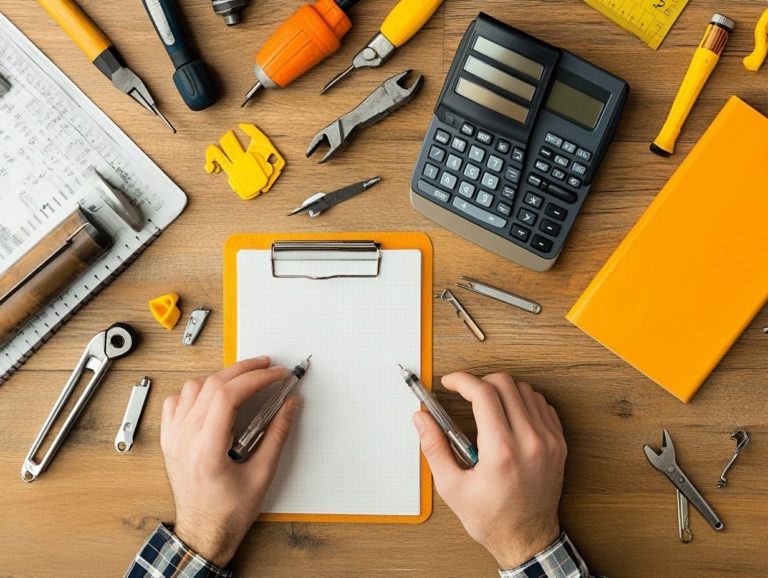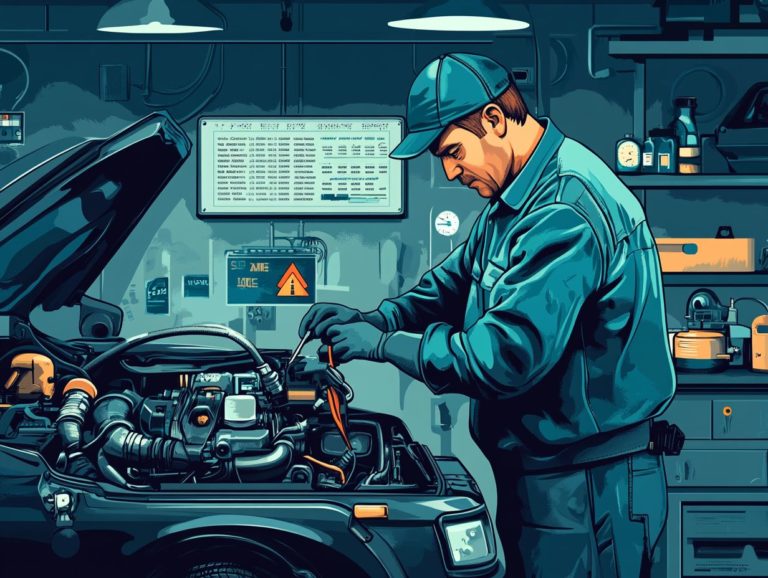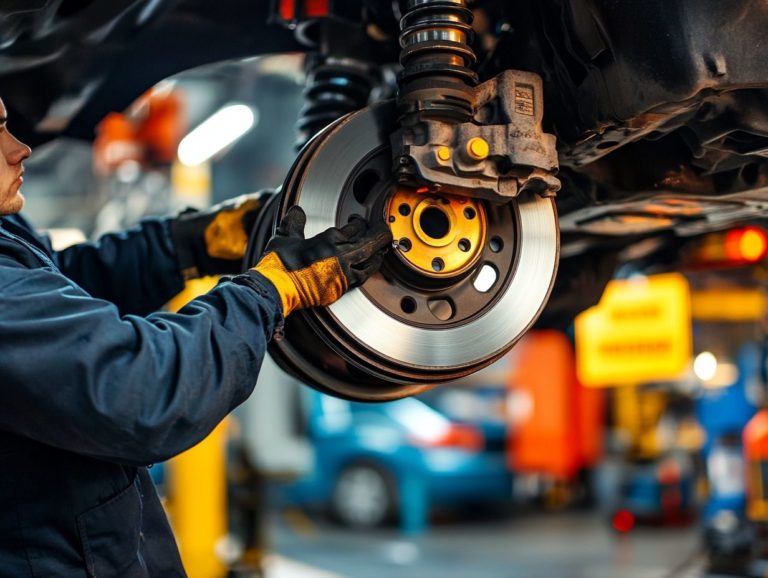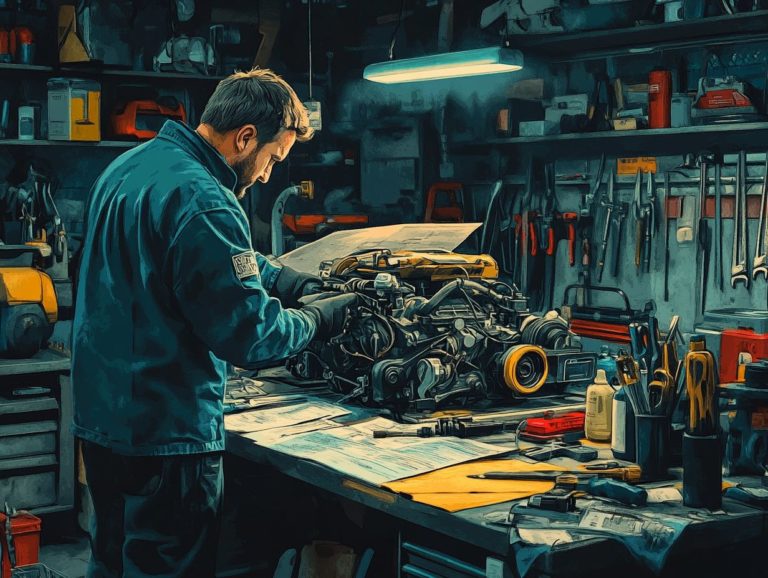Essential Tools for Common Car Repairs
Maintaining your vehicle doesn t have to feel like climbing a mountain especially when you have the right tools at your disposal!
From changing tires to diagnosing engine issues, a great toolkit empowers you to tackle repairs like a pro! This guide covers the tools you should have, like jack stands, wrench sets, and diagnostic code readers, while highlighting their practical uses, benefits, and important safety tips.
Discover how these tools can save you time and money while keeping your car running in peak condition!
Contents
- Key Takeaways:
- 1. Jack and Jack Stands
- 2. Wrench Set
- 3. Socket Set
- 4. Screwdriver Set
- 5. Pliers
- 6. Oil Filter Wrench
- 7. Spark Plug Wrench
- 8. Tire Pressure Gauge
- 9. Jumper Cables
- 10. Funnel
- 11. Brake Fluid Tester
- 12. Diagnostic Code Reader
- 13. Multimeter
- 14. Torque Wrench
- 15. Duct Tape
- Unlock Your Car’s Potential with Home Repairs!
- Frequently Asked Questions
- What are the essential tools for common car repairs?
- Can I use any type of screwdriver for car repairs?
- Do I need a specialized tool for changing a car’s oil?
- Why is a multimeter important for car repairs?
- Do I need to have a jack and jack stands for car repairs?
- What are the benefits of having my own set of tools for car repairs?
Key Takeaways:
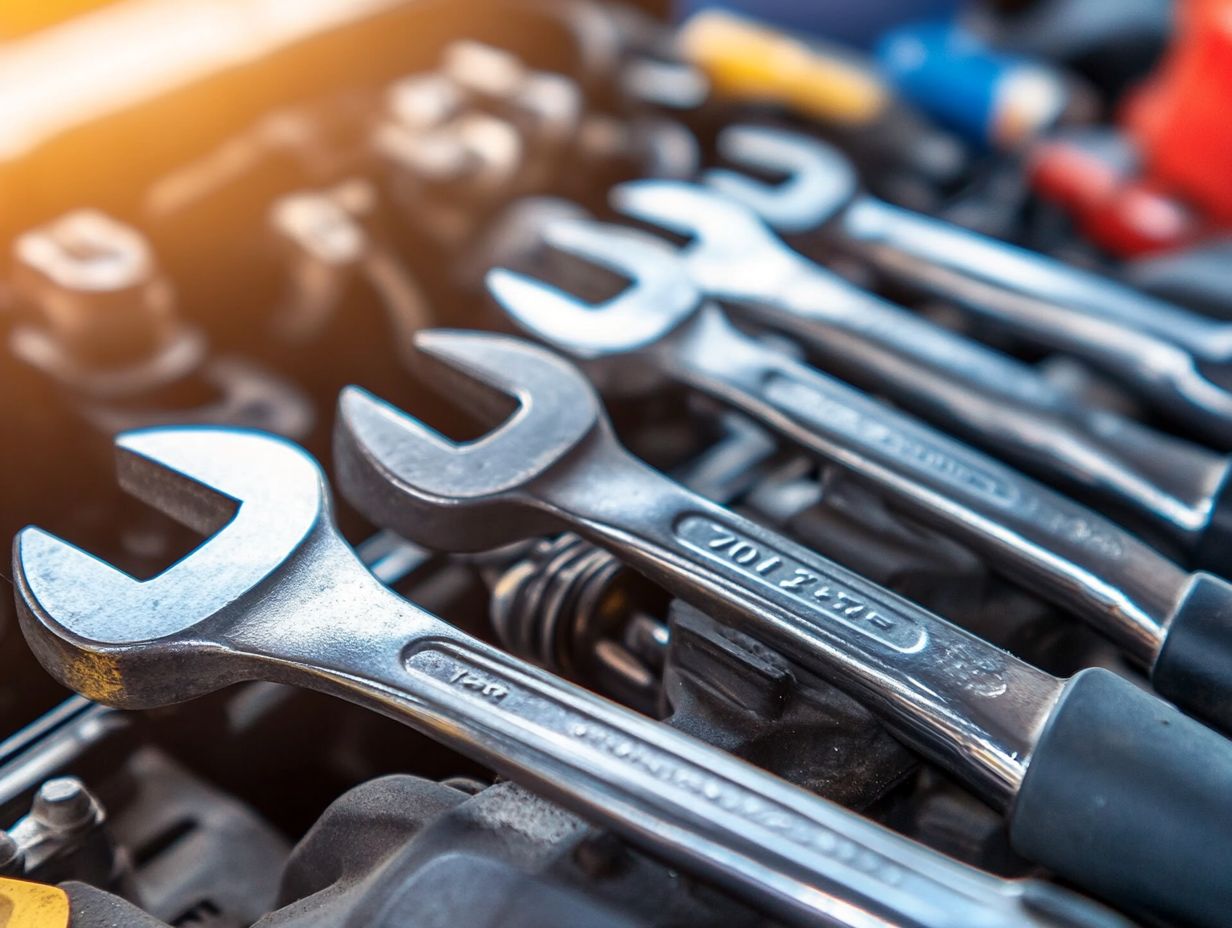
- Having tools like a jack and jack stands can help you perform common car repairs at home.
- These tools are useful for various repairs, from changing oil filters to checking tire pressure.
- Investing in these tools saves you time and money over the long term.
1. Jack and Jack Stands
Jack and jack stands are essential for anyone doing DIY auto maintenance. They provide the support and safety needed for vehicle repairs, whether you re doing a simple oil change or tackling more complex tasks. With the right vehicle jack and sturdy jack stands, you can lift your vehicle securely, giving you easy access to the undercarriage and ensuring a safer working environment.
There are various types of jacks to meet your lifting needs. Floor jacks are stable and user-friendly on flat surfaces, while bottle jacks are compact and perfect for tight spaces great for low-profile cars.
Always prioritize safety when using these tools. Check the weight capacity to avoid any mishaps. Jack stands provide extra security by supporting a lifted vehicle.
Regularly inspect your jack and stands to ensure they last and remain safe. Follow proper maintenance protocols, like lubricating moving parts and storing them in a dry place. This diligence extends their life and contributes to a safer working environment.
2. Wrench Set
A comprehensive wrench set is a must-have for DIY auto maintenance. It gives you the versatility and precision needed for various vehicle repairs, from simple adjustments to more detailed work.
Among the options available, combination wrenches are particularly useful. They have both an open end and a closed end, allowing you to work with different fasteners easily. Also, adjustable wrenches can adapt to various sizes, making them perfect for tricky fittings.
Another important tool is the breaker bar, designed to loosen stubborn bolts during repairs. When working in tight spaces, a ratcheting socket wrench becomes your best friend. Its quick-release mechanism boosts your efficiency, letting you work swiftly without hassle.
3. Socket Set
A socket set is an essential toolkit for any DIY auto maintenance enthusiast like yourself, providing the essential attachments needed to tackle a wide variety of automotive repairs and maintenance tasks with ease.
Having a well-rounded collection of sockets, including different sizes and types such as deep sockets and standard sockets, dramatically enhances your ability to reach various fasteners in tight spaces. This makes repairs not just possible, but much more manageable.
Don’t underestimate the importance of including a torque wrench in your toolkit. A torque wrench helps you tighten bolts to the right tightness, ensuring that bolts and nuts are tightened to the manufacturer’s specifications. This detail is crucial for your vehicle’s safety.
Precision extends the lifespan of your components and minimizes the chances of mechanical failures down the road. In essence, a comprehensive socket set paired with a trusted torque wrench serves as the backbone of your effective maintenance toolkit. This enables you to tackle tasks confidently and efficiently.
4. Screwdriver Set
You ll love how versatile a reliable screwdriver set is in your DIY auto maintenance toolkit, equipping you with the necessary tools for a wide array of vehicle repairs and adjustments. Among the many types, flathead and Phillips screwdrivers are particularly significant for automotive tasks.
Flathead screwdrivers excel at driving screws with a straight, horizontal slot perfect for securing interior panels or managing small components. Phillips screwdrivers, with their cross-shaped tip, provide superior grip and can handle a broader range of fasteners commonly found in modern vehicles. This diverse array of sizes ensures that you can confidently tackle everything from delicate electronic components to larger assemblies, seamlessly adapting to various screw designs while maintaining your vehicle’s structural integrity.
5. Pliers
Pliers are incredibly versatile tools that play a vital role in your DIY auto maintenance arsenal. You ll love how they allow you to grip, twist, and cut wires and other materials with ease during vehicle repairs.
Different types of pliers cater to your specific automotive needs, making them essential whether you’re an amateur or a seasoned professional. For example, needle-nose pliers are perfect for reaching those tight spots, letting you manipulate small components effortlessly. Slip-joint pliers boast adjustable jaws, making it easy to grip various sizes of nuts and bolts especially handy for loosening stubborn fasteners.
Then there are wire-cutting pliers, which efficiently snip through thick wires or cables, providing clean cuts that elevate the quality of your repairs. By incorporating these tools into your toolbox, you can significantly enhance your efficiency and effectiveness in tackling maintenance tasks.
6. Oil Filter Wrench
An oil filter wrench is an essential tool for your DIY auto maintenance toolkit, designed specifically to make removing and installing oil filters during oil changes a breeze. This invaluable device ensures that even the most stubborn filters are accessible, ultimately leading to a smoother and more effective maintenance routine.
There s a variety of oil filter wrenches available, each with its own unique advantages. Strap wrenches come with a flexible strap that securely grips the filter, making them perfect for those tight spaces where traditional tools just won t fit. Cap-style wrenches fit over the top of the filter, providing a solid grip for efficient removal without slipping.
Selecting the right size and type for your specific filter is crucial to prevent damage to both the filter and the wrench. Regularly changing oil filters isn t just vital for optimal engine performance; it also extends the lifespan of your vehicle. Don t wait for your oil change get a quality oil filter wrench today!
With these essential tools in hand, you re ready to take on any auto maintenance challenge!
7. Spark Plug Wrench
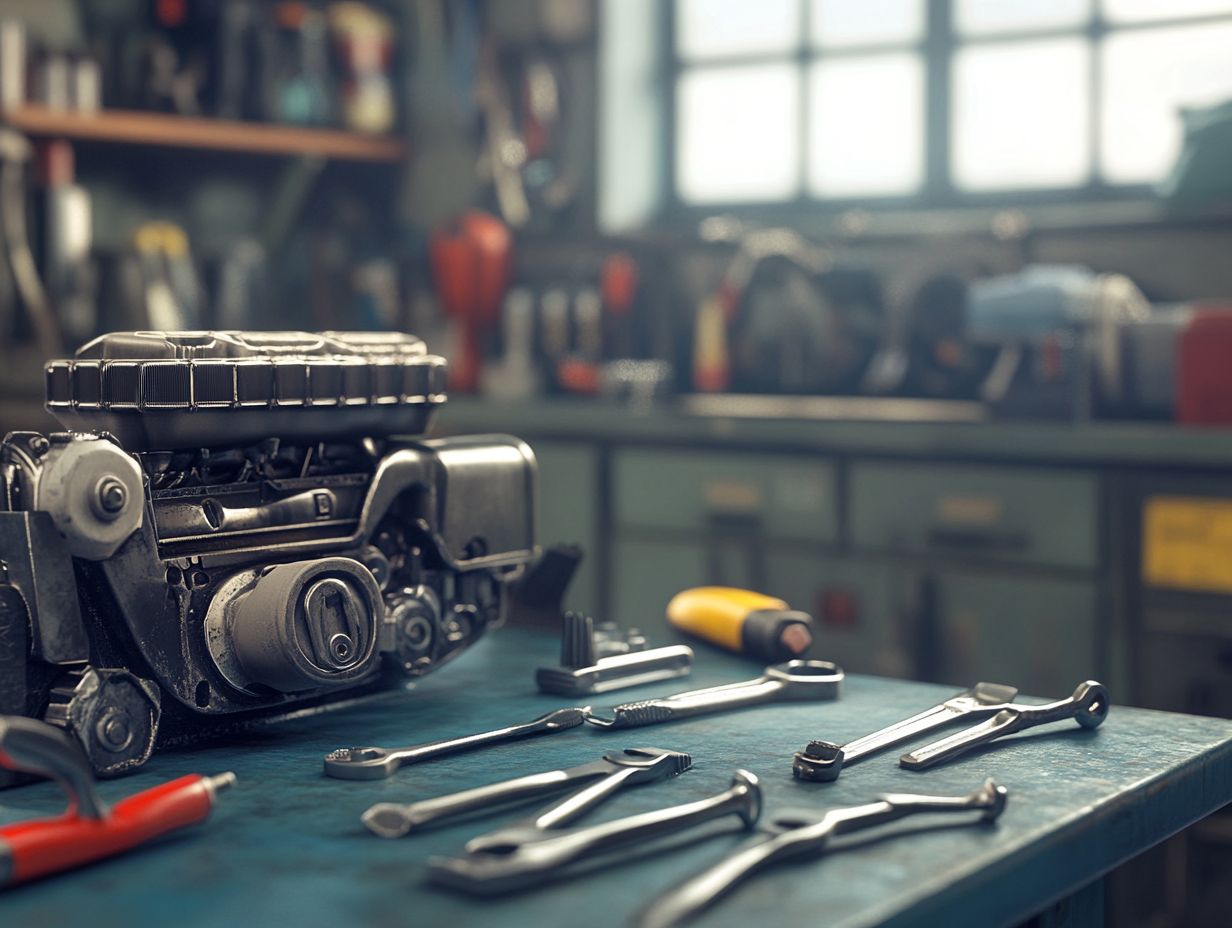
A spark plug wrench is an essential tool for anyone who enjoys DIY auto maintenance. It enables you to efficiently remove and install spark plugs during routine vehicle repairs.
These wrenches come in a variety of designs, such as deep socket wrenches wrenches that can reach deep into engine parts swivel-head versions, and even specialized types that fit into tighter spaces. Each style features unique attributes tailored to different engine configurations, ensuring you can easily access spark plugs, even in those snug spots.
This accessibility is crucial, as regularly checking and replacing spark plugs plays a significant role in maintaining best engine performance, enhancing fuel efficiency, and minimizing emissions. By selecting the right spark plug wrench, you can tackle maintenance tasks with confidence, keeping your vehicle running smoothly and extending its lifespan.
8. Tire Pressure Gauge
A tire pressure gauge is not just a tool; it’s an essential asset for anyone who takes pride in DIY auto maintenance. With its ability to accurately measure tire pressure, it ensures your vehicle performs optimally and safely.
Maintaining proper tire pressure is key for safety and efficiency. It boosts fuel economy, enhances handling, and makes your tires last longer. Low tire pressure can lead to excessive wear and increased effort needed to roll the tire, which can result in poor handling and higher fuel consumption. Conversely, over-inflated tires can jeopardize traction, resulting in an unstable ride.
You’ll find a variety of tire pressure gauges available, including:
- Digital
- Dial
- Pen-style
Each type offers ease of use and precise readings. Digital gauges provide quick and clear measurements, while dial gauges are celebrated for their durability and reliability, making tire maintenance a straightforward task for anyone.
9. Jumper Cables
Jumper cables are a must-have in your DIY auto maintenance toolkit, enabling you to effortlessly jump-start a vehicle with a dead battery. Don’t let a dead battery ruin your day being prepared means you’re ready for those surprises on the road!
Relying solely on cables may not cover every roadside emergency. A comprehensive jump-start kit should also include essential safety gear like gloves and goggles, which protect you from any potential sparks or corrosion.
Having clear, easy-to-follow instructions is vital to avoid mistakes that could cause significant damage. It s also wise to check your kit s compatibility with various vehicle types to ensure you’re fully equipped.
When it comes time to jump-start, remember to connect the positive terminal first. Keep those cables away from moving parts and avoid letting the cable clamps touch each other. This will help guarantee a safe and effective operation.
10. Funnel
A funnel is an essential tool for anyone diving into DIY auto maintenance, offering a simple tool that makes transferring fluids mess-free and easy.
When you re pouring oil into the engine or adding coolant to the radiator, using a funnel can significantly boost your efficiency and precision. There are various types of funnels tailored for specific needs, such as those designed for lubricants; these often have a narrower spout to fit snugly into tight spaces. Then, there s the larger, more versatile funnel, perfect for transferring fluids like water or cleaning agents.
Using this simple tool allows you to sidestep unsightly spills and maintain a tidy workspace, ensuring your entire process remains organized and effective.
11. Brake Fluid Tester
A brake fluid tester is a must-have for DIY auto maintenance. It helps you easily check the moisture content in your brake fluid.
By routinely monitoring this vital fluid, you can preemptively address potential issues that stem from contaminated brake fluid, like diminished braking efficiency or, worse yet, brake failure.
Using this device is straightforward: just dip the probe into the brake fluid reservoir and take note of the reading. This typically reveals the moisture level present. If the reading suggests excessive moisture, it s time to change the fluid.
Neglecting this crucial task could put your vehicle’s safety at risk. Degraded brake fluid undermines the entire braking system, making it nearly impossible to execute responsive stops in emergency situations.
12. Diagnostic Code Reader
A diagnostic code reader, often called an OBDII scanner, is essential for anyone who enjoys DIY auto maintenance. It allows you to retrieve trouble codes and diagnose issues with your vehicle.
By connecting this efficient device to your vehicle’s diagnostics plug typically located under the dashboard you gain access to valuable data regarding engine performance and fault codes. This tool helps you identify the nature of the problem and pinpoint the exact systems that may be affected.
Understanding these codes is vital, as they can range from minor issues like a loose gas cap to more serious malfunctions such as engine misfires. For effective troubleshooting, consult an online database for code definitions and recommended solutions. This ensures you address the underlying issues with precision.
13. Multimeter
A multimeter is an essential tool for anyone engaged in DIY auto maintenance. It measures electrical values like voltage, current, and resistance to diagnose electrical issues in your vehicle.
By effectively using this device, you can assess voltage across batteries, check current flow through circuits, and determine resistance in various components. This not only helps you identify faulty wiring or malfunctioning parts, but also plays a crucial role in maintaining your vehicle’s safety and functionality.
Understanding the multimeter s various settings equips you to make informed decisions about repairs and improvements, ensuring your vehicle remains both reliable and safe on the road.
14. Torque Wrench
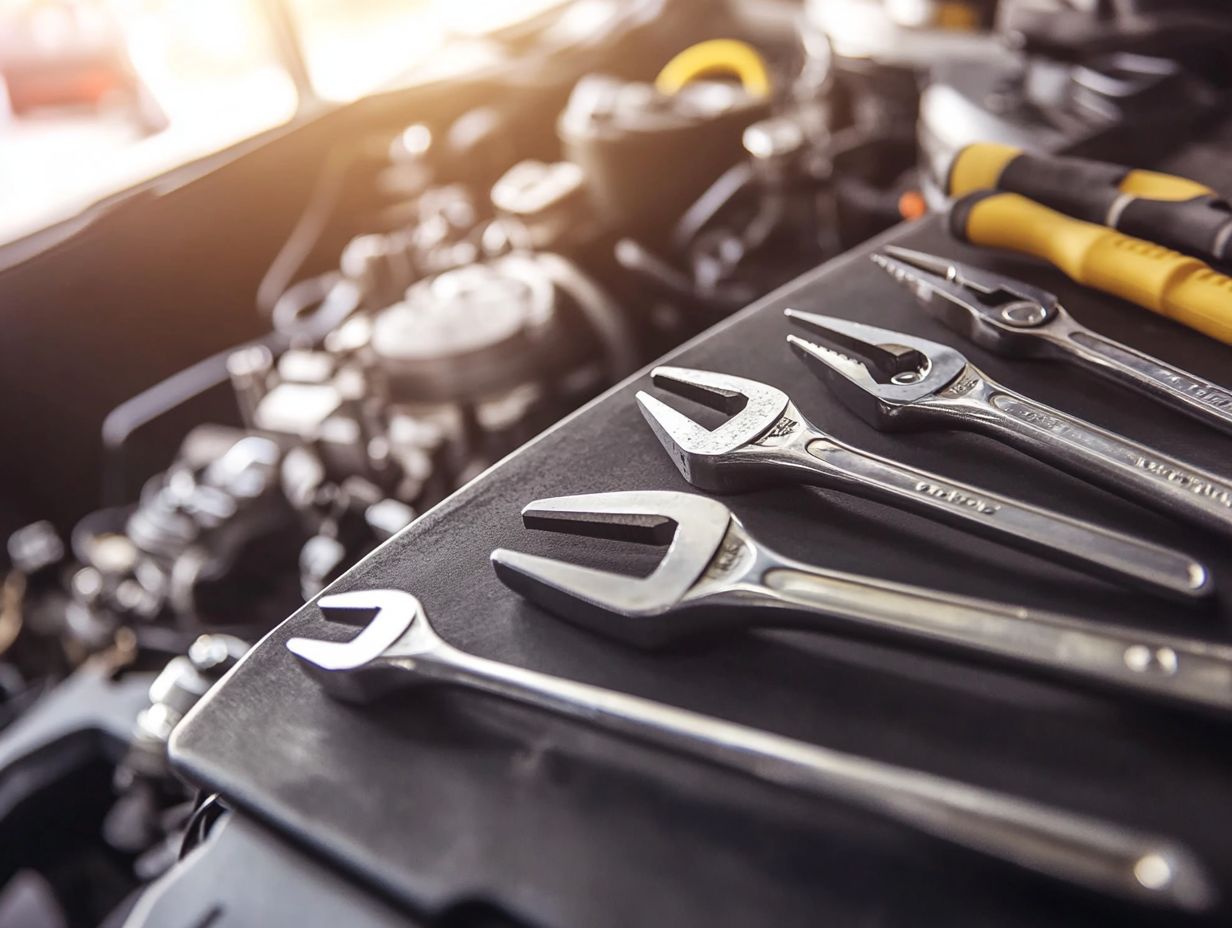
A torque wrench is an essential tool in your DIY auto maintenance toolkit. It ensures you tighten bolts and nuts to the manufacturer s specified torque settings during vehicle repairs.
Paying attention to detail keeps your vehicle safe and running smoothly. It prevents damage to components that can result from improper fastening techniques. By using a torque wrench, you can sidestep the common traps of over-tightening think stripped threads and broken bolts or under-tightening, which could lead to parts loosening while you’re on the road.
You ll find various types of torque wrenches available, including beam, click, and digital models, each designed for specific applications and precision needs. Understanding how to use each type can significantly elevate the effectiveness of your repairs, ensuring that every fastener is secured to perfection.
15. Duct Tape
Duct tape is an incredibly versatile tool for your DIY auto maintenance. It offers a quick fix for a variety of repairs on your vehicle.
From patching up leaking hoses to securing loose parts, it often comes to your rescue in a tight spot. Whether it s holding a side mirror in place or temporarily insulating worn-out wiring, its adhesive qualities perform surprisingly well under pressure.
However, while it s a handy aid in emergencies, remember its limitations. Relying solely on this adhesive wonder can lead to bigger issues down the road. Pursuing proper repairs whenever possible is essential to ensure your vehicle s long-term safety and functionality.
Unlock Your Car’s Potential with Home Repairs!
Many car repairs can be effectively performed at home. This makes DIY auto maintenance accessible for car owners looking to save money and gain valuable knowledge about their vehicles. Tasks like oil changes and spark plug replacements are just the beginning.
By tackling these straightforward repairs, you deepen your connection with your vehicle. You also ensure it runs smoothly over time. Simple tasks such as changing air filters, rotating tires, and replacing brake pads can significantly enhance your car’s performance and safety.
To achieve successful outcomes, having the right tools is essential. Basic items like wrenches, jacks, and oil catch pans can transform maintenance from a daunting chore into a manageable task. Additionally, learning how to stay prepared for common car repairs can further boost your confidence and help you achieve effective repairs.
Ultimately, this will extend the life of your beloved ride.
How Can These Tools Be Used for Different Car Repairs?
The wide array of mechanic tools at your disposal can significantly enhance your ability to tackle various vehicle repairs. This elevates both efficiency and effectiveness in your maintenance tasks.
For example, a torque wrench is a tool used to tighten bolts to the right tightness. This is crucial for your car to perform at its best! Similarly, a ratchet and socket set simplifies everything from changing oil to replacing brake pads, granting you quick access to tricky spots that often feel like a puzzle.
When diagnosing electrical issues, a multimeter is invaluable. It provides precise readings to help you pinpoint faults accurately.
By thoughtfully selecting the right tools for each repair task, you dramatically reduce frustration and elevate the quality of your work. This makes the repair process smoother and more enjoyable.
What Are the Benefits of Having These Tools at Home?
Having essential tools at home for DIY auto maintenance presents numerous advantages. These include substantial cost savings, unparalleled convenience, and the ability to handle timely vehicle repairs without relying on professional assistance.
By embracing do-it-yourself repairs, you can significantly cut down on labor costs. Instead of paying exorbitant hourly rates to mechanics, you can invest that money into high-quality tools or parts.
The satisfaction that comes from diagnosing a problem and fixing it yourself boosts your confidence. It also deepens your understanding of how your vehicle operates. The knowledge gained from each repair forms a solid foundation for future projects, nurturing a DIY spirit that can turn you into a skilled mechanic.
What Are the Safety Precautions to Keep in Mind When Using These Tools?
Safety precautions are essential for DIY auto maintenance. Protecting yourself is key, so use the right personal protective equipment and follow safe operating procedures.
Always wear gloves. They help you grip tools better and protect you from harmful substances. Wearing goggles is equally important to shield your eyes from debris and chemicals that may splatter during your work.
Dressing appropriately such as wearing long sleeves and closed-toe shoes significantly lowers your risk of injury. Familiarize yourself with the tools you ll be using. Understanding their specific operational guidelines is key to preventing accidents.
Grab your tools and start your first repair today! You ll be amazed at what you can achieve.
How Can These Tools Save Time and Money for Car Owners?
Utilizing the right tools for DIY auto maintenance can save you both time and money. This enables you to tackle vehicle repairs and routine maintenance tasks without the added burden of labor costs.
For instance, investing in a quality torque wrench ensures bolts are tightened to the manufacturer’s specifications, preventing future mechanical failures. A reliable OBD-II scanner a tool that helps you find problems with your car allows you to quickly diagnose issues before they escalate into more expensive problems, ultimately avoiding costly repairs down the road.
Regularly using essential tools like oil filter wrenches and creepers creates a smoother maintenance experience. This underscores the importance of having the proper equipment at your disposal. By prioritizing these tools, you enhance your automotive knowledge and embrace a sustainable approach to vehicle upkeep, fostering long-term savings and peace of mind.
Frequently Asked Questions
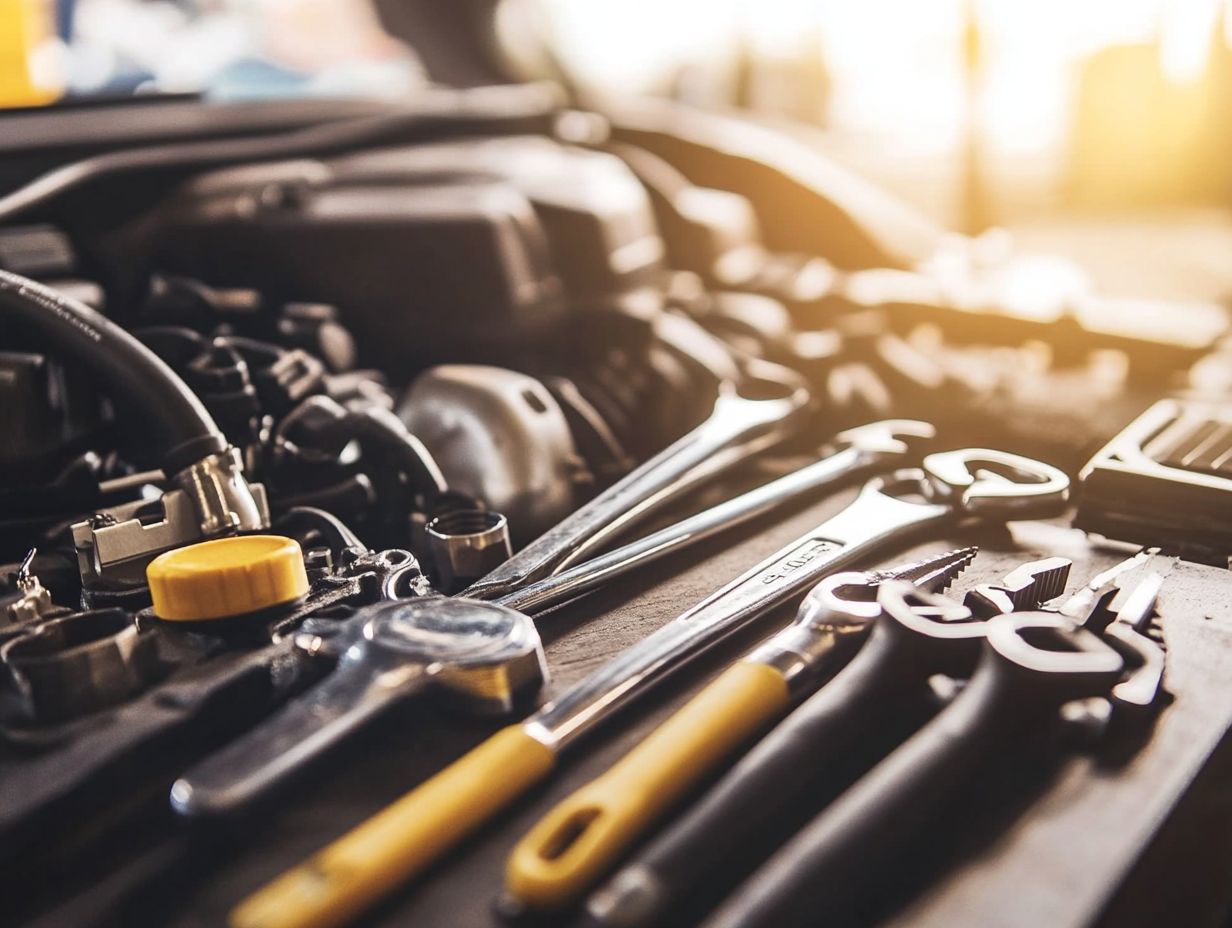
What are the essential tools for common car repairs?
The essential tools for common car repairs include a basic set of hand tools such as screwdrivers, wrenches, pliers, and sockets. Other tools like a jack and tire iron are necessary for changing a tire. For electrical issues, a multimeter, battery charger, and jumper cables are also important. To assist with routine maintenance tasks, refer to the essential tools for DIY car maintenance, which include a torque wrench, oil filter wrench, and oil drain pan.
Can I use any type of screwdriver for car repairs?
No, using the right screwdriver makes your repair tasks easier and more efficient! It’s crucial to use the correct type and size of screwdriver for car repairs. The wrong screwdriver can damage the screw head and make it difficult to remove. It’s recommended to have a set of both flathead and Phillips head screwdrivers in various sizes to handle different types of screws in a car.
Do I need a specialized tool for changing a car’s oil?
While it s possible to change a car’s oil without a specialized oil filter wrench, having one is highly recommended. Oil filter wrenches grip the oil filter securely, making it easier to remove. Trying to remove an oil filter without the proper tool can be time-consuming and frustrating.
Why is a multimeter important for car repairs?
A multimeter is essential for diagnosing electrical issues in a car. It measures voltage, current, and resistance, which are crucial for troubleshooting problems in the car’s electrical system. It can also check the battery’s charge and test various sensors and circuits.
Do I need to have a jack and jack stands for car repairs?
Yes, a jack and jack stands are necessary for any repairs that require lifting the car off the ground. It is vital to use these tools properly and ensure the car is stable and secure before working underneath it. Failure to do so can result in serious injury.
What are the benefits of having my own set of tools for car repairs?
Having your own set of tools for car repairs not only saves you time and money, but also allows you to handle routine maintenance tasks on your own. You can trust the quality and condition of your tools, ensuring they last for years to come. Additionally, having the necessary tools on hand can prevent delays and frustrations when unexpected car issues arise.


